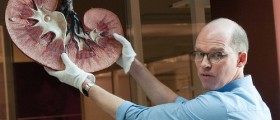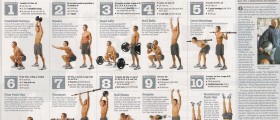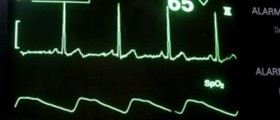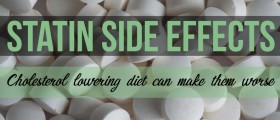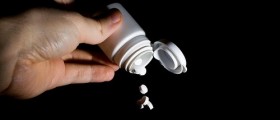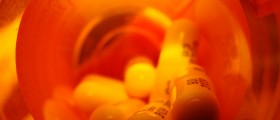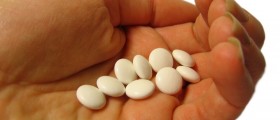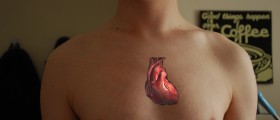Hi I feel the same I was diagnosed in March and have muscle pain. Memory seems ok but I'm concerned about the muscle weakness and pain. Doctors seem as if they don't believe me. Does you doc say it will get better?
Loading...
I had a very severe case of rhabdomylosis. I had acute kidney failure and i was in icu for 4 days and hospitalized for a month. I was on dialysis for about 7 weeks and thankfully my kidneys made a full 100 percent recovery. My left leg though where the problem started was blown up tremendously and i could not walk. It was huge.This happened 3 years ago and i workout regularly and am a very active person but my left leg is definetly much weaker then the left leg. Hurts when i bend it certain ways and just hurts sometimes. I wish i knew why or what to do.
Loading...
I had very similar experience. I also had acute kidney failure with dialysis for 2 months before kidney function returned . I still have overall muscle weakness and pain. It's been 13 months and worried that it's not improving. I need to exercise more but it's not easy. I hope your leg improves and comes back to pre rhabdo state. I used to be very active now I have trouble just getting around.
Loading...
Diagnosed, admitted to hospital for 4 days with Rhabdo in my arm. It’s been almost 2 years and even carrying my 30lbs son around causes weakness and tension in my arm. Rhabdo is pretty awful
Loading...
I got rhabdo in my left leg after taking cholesterol medicine. I went to the ER and they gave me liquids and morphine in an IV. I was later diagnosed with kidney disease. That was a few years ago. Now I suffer from nerve damage and restless leg syndrome in that same leg. I've been fighting it for years. I take nuerotin, ropinirole, and oxycodone and still have problems. Still working with my doctor.
Loading...
Any update on how your doing. I had a 101,000 cpk level 4 years ago from Crossfit and still can’t workout. Still have quick fatigue and exhaustion and can’t keep up with anybody and I meen not even out of shape people when I did try to go back to Crossfit. Also got the rabdo 2 more times when trying to workout even lightly. Dr.’s can’t figure it out.
Loading...
(NOTE: Forgive me. This is long post. I am VERY frustrated!!). I had Rhabdo on the High Desert portion of the Pacific Crest Trail (PCT) in June 2017. I’d hiked two 25’s, a 37, than set off on a 33. At 18, I crashed and couldn’t walk another step. Was peeing Coca-Cola. Two days in my hammock; I forced myself to eat, and drink & drink & drink water w/ electrolytes. An EMT friend caught up to me, and hiked w/ me 6 miles to an exit point. The Kaiser doctor did not know what Rhabdo was; hence no CPK test was done!!! Fortunately, I was not hospitalized, and a fellow Trail Angel who is an NP brought me to his home and cared for me for 10 days. On the 14th day, I headed up the PCT once more. I was only able to hike 15 a day!!! AND it was exhausting!!! I hiked another 400. I was weak, tired all day, and exhausted every single day!! I had ‘lost’ my hiking legs!! I bailed and returned to Trail Angeling in Oregon. I was able to ‘rescue’ two hikers that season. Each requiring 20+ mile round-trips in a single day. My last long distance rescue was early October 2017. I gingerly did 150 miles of the Southern Desert PCT in mid-October — 12 miles a day. I thought I was completely recovered. That is not the case!! So where am I leading? It’s now been 7 months. Interval training hurts like hell! I now have to wait two days to recover! I regained 12 lbs of muscle mass, than quickly lost it once I started training again!! Eating still makes me nauseous. I force myself to eat. I feel like I’m living in a Catch-22 Hell. I feel like my body’s metabolism has been irreversibly reset. Perhaps, I’ve completely misjudged the after effects of Rhabdo? I’ll push on, I’ve got 1,900 miles of the Te Araroa Trail in New Zealand starting in November this year. Am I nuts? Your thoughts or opinions, anyone?
Loading...
I am wondering if the pain from rhabdomyolysis ever goes away. My labs have returned to normal. The highest my CK was ~50,000. But, I still have pain in my right glute. My episode they think was caused by an IM injection of Phenergan.
Also, how long did it take you to exercise after this?
Also, how long did it take you to exercise after this?
Loading...
Have you looked into metabolic issues. I get rhabdo regularly often without much effort. Often it's the result of your body missing certain enzymes/pathways required to be able to use certain forms of energy, so your body burns your muscle for fuel. Look up "cpt deficiency", "glycogen storage diseases" as a start. I'm going for a muscle biopsy soon to see if I've got a faulty one.
Loading...
I have had Rhadomyolosis since late 1990's I had my first attack in my legs but no one gave me an official diagnosis until the 2000's before I graduated from college in 2008. I began having more symptoms I call them attacks and many times it happened out of no where without warning and so from 2009 through 2011 I was in and out of the hospital and had a doctor who refused to believe that I had Rhabdo even after that year being diagnosed again with it and it was documented in my medical records. They say it was from Lipidor/statins which I had only been on it briefly years ago in maybe early 1990's and quickly taken off by an endocrinologist who said I have good numbers and that it was not needed. I had to stop driving long drives because the sitting would cause a Rhabdo attack when I reach my destiny etc. I just wanted to share some history of my case because I live with Rhabdo attacks had to go to the ER in February 6 2020 and am not sure whether it was because my dr. put me back on Zetia/cholesterol med or if it was from my switching from my treadmill normal workout to strength training and a 20 minute stationary bike; I also should say that I am a diabetic/family history, a Veteran/peacetime, and a person who gets dehydrated something triggered this over the last couple years, so I have been, cut out caffeine or any thing that can make you dehydrated and I drink fluids including electrolyte waters. I had an attack in February 2020 immediately after the bike exercise 20 minutes trip ER I knew it was Rhabdo I could tell because it made me feel sick in my body and muscle fatigue followed the first bad painful attack which I manage to walk it off even though it felt like a serious shock to my body. They gave me an IV treatment and thank God I was released to go home which I was seen 4 weeks later by Rheumenologist. My test showed the count went back to normal from 36000 to 240. I am on a quest to find a way to stop this from happening because every time I lay down to sleep I suffer bad feet and leg cramps and spasms that makes me jump out of bed forced to walk it off until it calms downs sometime it hurt so bad I am ready to call 911 if it does not calm down. This is a bad way to live because my sleep is disrupted and when I do finally get to sleep I am too worn out by these events nightly. The VA Clinic which is my healthcare provider has given me statins since I have been there from 2010 and curently even though my private records told them I had some history with this problem so this was neglegent on their part along with the doctor who refused to believe that I have Rhabdo. I believe the Rhabdo is in my body that continues to create problems in my having a good consistent exercise/strength regimen. I need to exercise for diabetes/weight management. I need an answer to my condition I am medically disabled but still trying to live my life if I can get this gone or under control. Please any advice or information is welcomed. Thank you, CeJ
Loading...
Hi I am CeCe,
I am seeking my knowledge from those who are experiencing this condition. I have had Rhabdomyolysis since late 1990's I had my first attack in my legs but no one gave me an official diagnosis until the 2000's before I graduated from college in 2008. I began having more symptoms I call them attacks and many times it happened out of no where without warning and so from 2009 through 2011 I was in and out of the hospital and had a VA doctor who refused to believe that I had Rhabdo even after that year before 2008 and again in 2011, 2013 being diagnosed again with it and it was documented in my medical records private records when I came to the VA for health care. They say it was from Lipidor/statins which I had only been on it briefly years ago in maybe early 1990's and quickly taken off by an endocrinologist who said I have good numbers and that it was not needed. I was a victim of doctors who put people on all kinds of medicines under the guise of medical prevention/management of diabetes. I had to stop driving long drives because the sitting would cause a Rhabdo attack when I reach my destiny also etc. I just wanted to share some history of my case because I live with Rhabdo attacks to this day. I had to go to the ER in February 6 2020 and am not sure whether it was because my dr. put me back on Zetia/cholesterol med or if it was from my switching from my treadmill normal workout to strength training and a 20 minute stationary bike. I also should say that I am a diabetic/family history, a Veteran/peacetime, and a person who gets dehydrated, something triggered this over the last couple years, so I have been, cut out caffeine or any thing that can make you dehydrated and I drink fluids including electrolyte waters. I had an attack in February 2020 immediately after the bike exercise 20 minutes which I considered low impact compared to the treadmill. I went to the ER because I knew it was Rhabdo I could tell because it made me feel sick in my body and muscle fatigue followed the first bad painful attack that happened about 10 days before, which I manage to walk it off even though it felt like a serious shock to my body. They gave me an IV treatment and thank God I was released to go home which I was seen 4 weeks later by Rheumatologist. My test showed the count went back to normal from 36000 to 240. I am on a quest to find a way to stop this from happening because every time I lay down to sleep I suffer bad feet and leg cramps and spasms that makes me jump out of bed forced to walk it off until it calms downs sometime it hurt so bad I am ready to call 911 if it does not calm down tis happens daily. This is a bad way to live because my sleep is disrupted and when I do finally get to sleep I am too worn out by these events nightly. The VA Clinic which is my healthcare provider has given me statins since I have been there from 2010 and currently even though my private records told them I had some history with this problem so this was negligent on their part along with the VA doctor who refused to believe that I have Rhabdo. I believe the Rhabdo is in my body that continues to create problems in my having a good consistent exercise/strength regimen which I keep having to restart every time it stops me. It feels like this Rhabdo is exercised induced like my body is fighting me against the exercise I do. However, I need to exercise for diabetes/weight management. I need an answer to my condition I am medically disabled but still trying to live my life if I can get this gone or under control. I have tried many of the things I seen written here and elsewhere so far in my search. Please any advice or information is welcomed. Thank you, CeJ
Home Medical Answers Body & Health Conditions Musculoskeletal Issues
Rhabdomyolysis: Does the Pain Ever Stop?
by Robert Rister — over a year ago in Musculoskeletal Issues
Rhabdomyolysis is often thought of as a "rare" condition
, but about 200,000 people a year develop it, just in the United States. Rhabdomyolysis involves the breakdown of muscle tissue, usually triggered by a crushing injury, dehydration, a bite from a venomous snake, a bite from a poisonous insect, or medications, but it isn't just the breakdown of muscle tissue.
Part of what is going on in rhabdomyolysis on the cellular level is damage to a microscopic structure known as the sarcolemma. Functioning on the membrane surrounding the cell, the sarcolemma houses even tinier channels for the flow of electrolytes in and out of the cell. One of these channels pumps sodium and potassium, both of which are positively charged ions, in and out of the cell as it makes energy in the form of ATP. To make energy, the cell needs glucose, which is transported with a net-negative charge. Every time a molecule of glucose enters the cell, three positively charged sodium ions go in with it. The cell maintains its charge by sending two positively charged potassium ions out. However, if the sarcolemma is damaged, either the sodium can't go in or the potassium can't go out, so the cell can't make energy.
Right after an injury, cells run down. They go into hibernation mode. However, when the injury that damaged the sarcolemma is treated, or when blood circulation is restored, suddenly they get lots of oxygen again. The problem is they can't use it. That oxygen forms free radicals of oxygen, which trigger inflammatory reactions, causing pain, and generating free radicals, which damage adjacent, healthy tissues.
As a result, when you start healing from the injury that caused your rhabdomyolysis, you begin to experience even worse pain. But what does that tell you about how to reduce the pain?
Changes in diet can help. Generally speaking, you need more potassium and less sodium (more fruits and vegetables, and less salt). This helps your muscles deal with the sodium-potassium imbalance that was started by the original injury.
Fructose is usually considered bad for your health, but in rhabdomyolysis, it can be beneficial. Cells use it for energy through a different pathway that doesn't involve insulin, potassium, and sodium exchanges (at least not in the same way). Fructose can relieve pain.
Medium-chain triglycerides provide your muscles with another energy source they can use easily as they recover from the injury that caused the tissue to break down. Also known as MCTs, these healthy fats are particularly abundant in coconut oil.
Caffeine, nicotine, and other stimulants should be avoided while you are recovering. These stimulants make your muscles twitch and interfere with their repair.
It's especially important to make sure you get enough water while you are recovering from rhabdomyolysis (unless your doctor has specifically told you to limit your consumption of water as your kidneys are recovering). If you haven't had kidney damage, the water helps your muscles repair. Muscles "pump up" with glycogen, which they make from glucose and water. Each muscle cell has to make its own glycogen, so each muscle cell needs both glucose and water. Also, muscles cannot use creatine without water. You simply cannot rebuild muscles if you are dehydrated.
Avoid high-CBD marijuana, Oxycontin, and opioids while you are recovering from rhabdomyolysis. These illicit drugs relax you, which isn't a bad thing in itself, whatever one says about the legality and morality of using these drugs, but if you are so "relaxed" that you develop pressure sores as you sleep, you can have still more damaged tissue for your kidneys to detox and your body to repair.
You may not be able to prevent having rhabdomyolysis once, but you usually can avoid having it twice. Don't repeat the muscle injuries or expose yourself to the dehydration that caused the problem. If that means talking to or standing up to a coach who insists on workouts in the heat or working out so hard that your muscles break down in the weight room, that's what you have to do.
I am seeking my knowledge from those who are experiencing this condition. I have had Rhabdomyolysis since late 1990's I had my first attack in my legs but no one gave me an official diagnosis until the 2000's before I graduated from college in 2008. I began having more symptoms I call them attacks and many times it happened out of no where without warning and so from 2009 through 2011 I was in and out of the hospital and had a VA doctor who refused to believe that I had Rhabdo even after that year before 2008 and again in 2011, 2013 being diagnosed again with it and it was documented in my medical records private records when I came to the VA for health care. They say it was from Lipidor/statins which I had only been on it briefly years ago in maybe early 1990's and quickly taken off by an endocrinologist who said I have good numbers and that it was not needed. I was a victim of doctors who put people on all kinds of medicines under the guise of medical prevention/management of diabetes. I had to stop driving long drives because the sitting would cause a Rhabdo attack when I reach my destiny also etc. I just wanted to share some history of my case because I live with Rhabdo attacks to this day. I had to go to the ER in February 6 2020 and am not sure whether it was because my dr. put me back on Zetia/cholesterol med or if it was from my switching from my treadmill normal workout to strength training and a 20 minute stationary bike. I also should say that I am a diabetic/family history, a Veteran/peacetime, and a person who gets dehydrated, something triggered this over the last couple years, so I have been, cut out caffeine or any thing that can make you dehydrated and I drink fluids including electrolyte waters. I had an attack in February 2020 immediately after the bike exercise 20 minutes which I considered low impact compared to the treadmill. I went to the ER because I knew it was Rhabdo I could tell because it made me feel sick in my body and muscle fatigue followed the first bad painful attack that happened about 10 days before, which I manage to walk it off even though it felt like a serious shock to my body. They gave me an IV treatment and thank God I was released to go home which I was seen 4 weeks later by Rheumatologist. My test showed the count went back to normal from 36000 to 240. I am on a quest to find a way to stop this from happening because every time I lay down to sleep I suffer bad feet and leg cramps and spasms that makes me jump out of bed forced to walk it off until it calms downs sometime it hurt so bad I am ready to call 911 if it does not calm down tis happens daily. This is a bad way to live because my sleep is disrupted and when I do finally get to sleep I am too worn out by these events nightly. The VA Clinic which is my healthcare provider has given me statins since I have been there from 2010 and currently even though my private records told them I had some history with this problem so this was negligent on their part along with the VA doctor who refused to believe that I have Rhabdo. I believe the Rhabdo is in my body that continues to create problems in my having a good consistent exercise/strength regimen which I keep having to restart every time it stops me. It feels like this Rhabdo is exercised induced like my body is fighting me against the exercise I do. However, I need to exercise for diabetes/weight management. I need an answer to my condition I am medically disabled but still trying to live my life if I can get this gone or under control. I have tried many of the things I seen written here and elsewhere so far in my search. Please any advice or information is welcomed. Thank you, CeJ
Home Medical Answers Body & Health Conditions Musculoskeletal Issues
Rhabdomyolysis: Does the Pain Ever Stop?
by Robert Rister — over a year ago in Musculoskeletal Issues
Rhabdomyolysis is often thought of as a "rare" condition
, but about 200,000 people a year develop it, just in the United States. Rhabdomyolysis involves the breakdown of muscle tissue, usually triggered by a crushing injury, dehydration, a bite from a venomous snake, a bite from a poisonous insect, or medications, but it isn't just the breakdown of muscle tissue.
Part of what is going on in rhabdomyolysis on the cellular level is damage to a microscopic structure known as the sarcolemma. Functioning on the membrane surrounding the cell, the sarcolemma houses even tinier channels for the flow of electrolytes in and out of the cell. One of these channels pumps sodium and potassium, both of which are positively charged ions, in and out of the cell as it makes energy in the form of ATP. To make energy, the cell needs glucose, which is transported with a net-negative charge. Every time a molecule of glucose enters the cell, three positively charged sodium ions go in with it. The cell maintains its charge by sending two positively charged potassium ions out. However, if the sarcolemma is damaged, either the sodium can't go in or the potassium can't go out, so the cell can't make energy.
Right after an injury, cells run down. They go into hibernation mode. However, when the injury that damaged the sarcolemma is treated, or when blood circulation is restored, suddenly they get lots of oxygen again. The problem is they can't use it. That oxygen forms free radicals of oxygen, which trigger inflammatory reactions, causing pain, and generating free radicals, which damage adjacent, healthy tissues.
As a result, when you start healing from the injury that caused your rhabdomyolysis, you begin to experience even worse pain. But what does that tell you about how to reduce the pain?
Changes in diet can help. Generally speaking, you need more potassium and less sodium (more fruits and vegetables, and less salt). This helps your muscles deal with the sodium-potassium imbalance that was started by the original injury.
Fructose is usually considered bad for your health, but in rhabdomyolysis, it can be beneficial. Cells use it for energy through a different pathway that doesn't involve insulin, potassium, and sodium exchanges (at least not in the same way). Fructose can relieve pain.
Medium-chain triglycerides provide your muscles with another energy source they can use easily as they recover from the injury that caused the tissue to break down. Also known as MCTs, these healthy fats are particularly abundant in coconut oil.
Caffeine, nicotine, and other stimulants should be avoided while you are recovering. These stimulants make your muscles twitch and interfere with their repair.
It's especially important to make sure you get enough water while you are recovering from rhabdomyolysis (unless your doctor has specifically told you to limit your consumption of water as your kidneys are recovering). If you haven't had kidney damage, the water helps your muscles repair. Muscles "pump up" with glycogen, which they make from glucose and water. Each muscle cell has to make its own glycogen, so each muscle cell needs both glucose and water. Also, muscles cannot use creatine without water. You simply cannot rebuild muscles if you are dehydrated.
Avoid high-CBD marijuana, Oxycontin, and opioids while you are recovering from rhabdomyolysis. These illicit drugs relax you, which isn't a bad thing in itself, whatever one says about the legality and morality of using these drugs, but if you are so "relaxed" that you develop pressure sores as you sleep, you can have still more damaged tissue for your kidneys to detox and your body to repair.
You may not be able to prevent having rhabdomyolysis once, but you usually can avoid having it twice. Don't repeat the muscle injuries or expose yourself to the dehydration that caused the problem. If that means talking to or standing up to a coach who insists on workouts in the heat or working out so hard that your muscles break down in the weight room, that's what you have to do.
Loading...
I am sorry I accidentally copy/paste another article with my comments. If it can be removed then remove it as I am not claiming it as my information/no plagiarism intended here although the name of the original writer is listed: Home Medical Answers, by Robert Rister
Loading...
I had Rhabo and Septic Shock just over a year ago was in ICU for 5 weeks 3 of those in a coma during that time I had open heart surgery spent a lot of time on and off Dialysis have no memories of nearly all that time except toward the end of it. I know am very lucky to be alive but my heart now works very very well my problems are all muscular I have been left in so much pain at times I wonder if the pain will ever end ( not sure I will ever see the inside of a gym ever again not once in the 3 months did I ever get told about the Rhabdo how I caught it let alone what to expect afterward I have now started a target physio regime just very very gentle workouts by my standards to try and stretch the muscles as I lost all my muscle mass due to ICU inactivity throw in Rhabdo and Sepsis my muscles really did think they were dieing but hey they were and along side the rest of the body then regaining the strength and mass my body is so confused a bit like I am I just wish I could shake all this pain and get on with life again anyone reading this please please take Rhabdo seriously it is a killer.
Loading...



